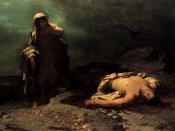Tragedy
Developed in the 5th century.
Aristotle said of it that it was cathartic. We feel relief at this 'self-analysis'.
In tragedy Aristotle believed that the Plot is most important, followed by Character, followed by Thought, and finally by Language, Melody and Spectacle.
They illuminate us ethically.
The conflict in tragedy produces character and habit of moral choice, through suffering and pathos.
Antigone Plot
Antigone is the brother of Polynites, the sister of Ismene and is engaged to Lord Creon's son Haemon.
Polynites is regarded as a traitor and is therefore not allowed by Lord Creon to be properly buried which enrages Antigone.
She is caught trying to bury her brother and as a result is sealed up alive in a cave. Antigone- 'Struck by fate, I descend alive to the caverns of the dead'.
Lord Creon's decision leads to unrest in the city and Tiresias, a blind prophet, predicts the people will rise.
Creon ignores and banishes him.
Creon then changes his mind and goes to the cave but finds her hanging from a rope.
Haemon, who at first goes along with his father's decision, also rebels and tries to save Antigone but also arrives too late. When Creon finds them in the cave, Haemon tries to kill him with his sword but misses and then kills himself.
Eurydice, Creon's wife, kills herself when she hears the news.
Creon is left in despair 'Oh the agony, the heartbreaking agonies of our lives.' 'I am no-one, nothing'.
Lacant's Reading
The play is about law versus desire. Antigone's desire, according to Lacant, 'visibly eminates from the eyes of this admirable girl'.
When Antigone makes the decision to bury her brother she steps outside Lacant's symbolic order of the law and into the law of her own...


